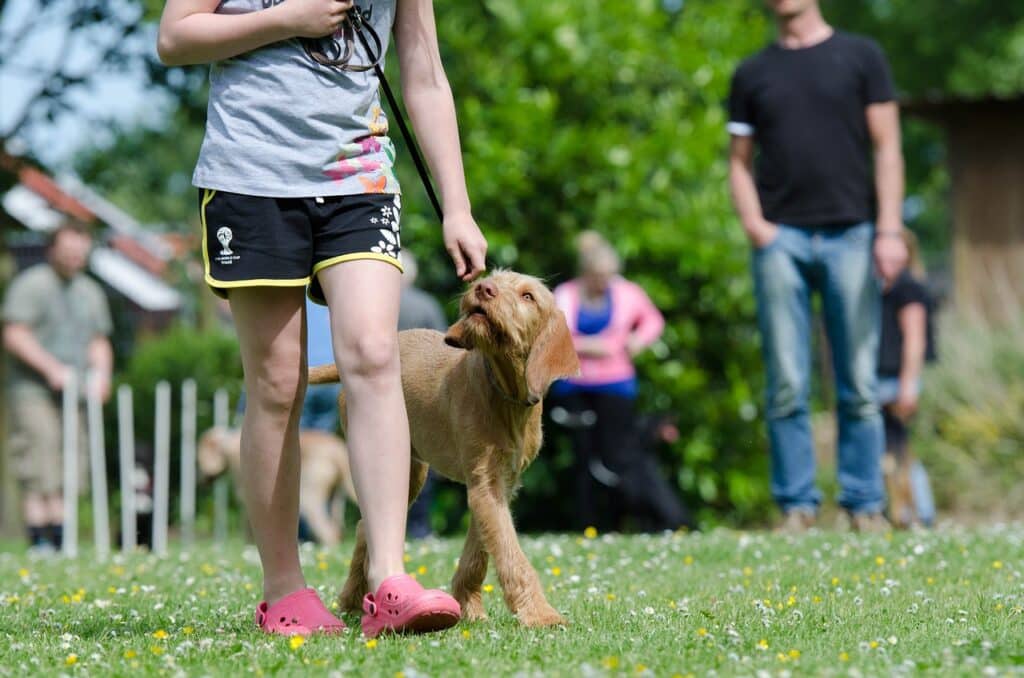
DIY Dog Training
DIY (Do-It-Yourself) dog training refers to the process of training your dog at home by yourself, without the assistance of a professional trainer. This involves teaching your dog basic commands, manners, and appropriate behavior using various training techniques.
DIY dog training can include everything from house training a puppy to teaching basic commands like “sit,” “stay,” and “come” to more advanced training such as tricks or agility skills. The methods used can vary widely but often involve positive reinforcement techniques, where good behavior is rewarded with treats, praise, or play.
This type of training requires patience, consistency, and an understanding of dog behavior. It’s important to remember that each dog is unique, and what works for one might not work for another. Therefore, it may require some trial and error to find the most effective training method for your specific dog.
While DIY dog training can be a rewarding experience that helps strengthen the bond between you and your pet, it can also be challenging, especially for first-time dog owners or for those dealing with particularly stubborn or behavioral issues. In such cases, it might be beneficial to seek advice from a professional dog trainer or enroll in a dog training class.
Pros:
1. Cost-Effective: DIY training is generally cheaper as you’re not paying for a professional’s time.
2. Flexible Schedule: You can train your dog at any time that suits you, providing flexibility.
3. Bonding Time: Training your dog by yourself strengthens the bond between you and your pet as it involves spending quality time together.
Cons:
1. Lack of Expertise: Without professional knowledge, you might struggle to correct behavioral issues or teach complex commands.
2. Time-Consuming: Training a dog requires patience and consistency. It can be time-consuming, especially if you’re new to it.
3. Inconsistency: Without proper knowledge, there might be inconsistency in training methods, which can confuse the dog.
Hiring a Professional
Hiring a trusted professional dog trainer can be an excellent choice for many dog owners, especially those dealing with specific behavioral issues or those who are new to dog ownership. A professional trainer has the knowledge and experience to train your dog effectively and address any problems.
Here’s what you need to know about hiring a professional dog trainer:
- Finding a Trainer: Look for certified trainers in your area. You can also ask for recommendations from your vet, local pet stores, or other dog owners. Online directories of professional organizations for dog trainers can also be helpful.
- Check Credentials and Experience: Ensure the trainer is certified and has experience, especially with your breed of dog or the specific issues you’re facing.
- Training Methods: Ask about their training methods. Most professionals use positive reinforcement techniques, which reward good behavior. Avoid trainers who use harsh punishment or dominance techniques.
- Cost: The cost of a professional dog trainer can vary widely based on their experience, the type of training, and the length of the program. Be sure to understand all costs before starting a program.
- Personalized Training Plan: A good trainer will tailor the training program to suit your dog’s individual needs and personality. They should also involve you in the training process, as consistency between their sessions and your at-home training is key to success.
- Follow-Up Support: Check if they provide follow-up support after the training program ends. This can be helpful if new issues arise or old ones resurface.
Pros:
1. Expertise: Professionals have the exact knowledge and experience to train your dog effectively and address specific behavioral issues.
2. Efficiency: A professional trainer can often achieve results more quickly because of their expertise and consistent techniques.
3. Personalized Training: A professional can tailor the training program to suit your dog’s individual needs and personality.
Cons:
1. Cost: Hiring a professional dog trainer can be expensive.
2. Availability: You’ll need to coordinate schedules with the trainer, which might not always be convenient.
3. Less Personal Involvement: While professionals do the bulk of the training, it might affect the bonding process between you and your dog. Also, dogs may behave differently with trainers than they do with their owners.
Remember, the goal of hiring a professional dog trainer is not just to train your dog but also to teach you how to effectively communicate with your pet. It’s important that you feel comfortable with the trainer and their methods, as you’ll be working closely with them to ensure your dog’s success.



